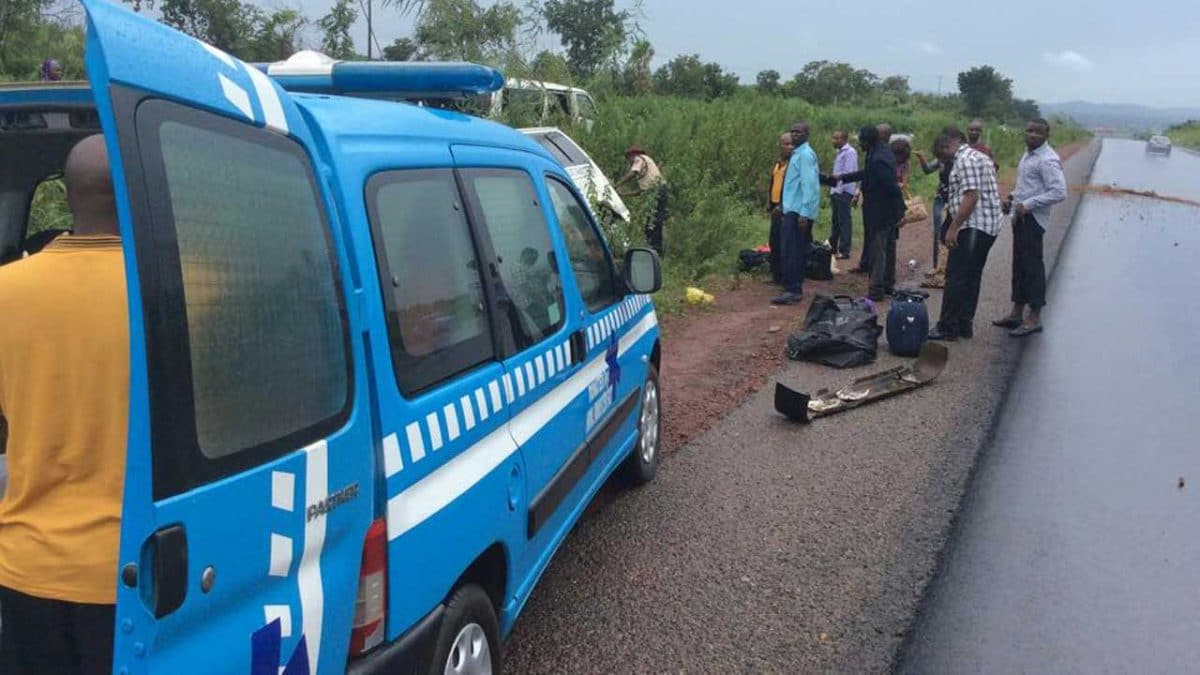A devastating road accident in Jigawa State’s Gwaram Local Government Area has resulted in three fatalities and left fourteen others with various degrees of injuries, highlighting once again the persistent challenge of road safety in Nigeria’s rural communities. The tragic incident occurred along the old Gwaram Road when a fully loaded J5 bus collided with a parked Dangote trailer.
According to Police Spokesman DSP Lawan Shiisu Adam, the accident took place on Tuesday evening around 6:30 pm, involving a J5 bus with registration number KTG 196 XC. The vehicle, driven by Wada Shuaibu from Laya village, was carrying seventeen passengers returning from Sara market when tragedy struck at Kwanar Mangwarori.
The circumstances of the accident paint a concerning picture of road safety challenges in rural areas. The J5 bus, fully loaded with market-goers, crashed into an empty Dangote trailer bearing registration number BNK 447 XA, which was reportedly en route from old Gwaram to Kano State. The impact of the collision was severe enough to cause injuries to all occupants of the bus.
Local authorities responded swiftly to the emergency. Upon receiving the report, police teams were immediately dispatched to the accident scene, where they coordinated the evacuation of all victims to Gwaram Cottage Hospital for urgent medical attention. Despite the prompt response and medical intervention, three victims succumbed to their injuries, while the remaining fourteen continue to receive treatment.
In accordance with local customs and religious practices, the bodies of the deceased were released to their families for burial after medical certification of death. Meanwhile, police have launched a comprehensive investigation into the circumstances surrounding the accident, with particular focus on locating and apprehending the driver for questioning.
This tragic incident brings to the forefront several critical issues regarding road safety in rural Nigeria. The collision between a moving vehicle and a stationary trailer raises questions about visibility, road signage, and the practice of parking heavy vehicles along major routes. It also highlights the ongoing challenges faced by rural communities in terms of emergency response and healthcare capacity.
The accident’s timing – during the evening hours when visibility typically begins to decrease – adds another layer of concern to the safety discourse. Rural roads, often lacking adequate lighting and proper maintenance, become particularly hazardous during these hours, especially for vehicles carrying multiple passengers.
The involvement of a market-bound vehicle adds a socio-economic dimension to the tragedy. In rural areas, market days are crucial economic and social events, with many residents depending on such gatherings for their livelihoods. The loss of lives and injuries sustained in such circumstances not only affects families emotionally but also impacts the broader community’s economic well-being.
Local residents who witnessed the aftermath of the accident expressed their concerns about the frequency of such incidents along this stretch of road. The old Gwaram Road, like many rural highways in Nigeria, has seen its share of accidents, prompting calls for improved road safety measures and better enforcement of traffic regulations.
The police investigation will likely focus on several key aspects, including the condition of both vehicles involved, the circumstances leading to the trailer being parked along the road, and any potential contributing factors such as speed, road conditions, or driver fatigue. The outcome of this investigation could provide valuable insights for preventing similar tragedies in the future.
As the community grapples with this latest tragedy, questions arise about the need for enhanced safety measures on rural roads, including better lighting, clear signage, and designated parking areas for heavy vehicles. The incident also underscores the importance of driver education and awareness, particularly regarding the risks of night driving and the need for increased vigilance on rural roads.
The accident serves as a somber reminder of the ongoing challenges in ensuring road safety across Nigeria’s vast rural landscape. As authorities continue their investigation and the injured receive treatment, the incident adds urgency to calls for improved road safety measures and infrastructure development in rural areas.
The tragedy at Kwanar Mangwarori stands as a stark reminder of the human cost of road accidents and the critical importance of implementing and enforcing comprehensive road safety measures, particularly in rural areas where emergency response resources may be limited.



